South Sudan - How is the youngest country?
I followed the news every other day since they signed the peace agreement and based on the results it seemed to be a convenient time to visit the country. It can be expected that the peace probably won't last forever and when the fighting starts again it will be worse. So maybe better visit now than later.
It’s the first time since the beginning of South Sudan that they are at peace now.
The country is the newest on the planet as it was established only a few years ago in 2011, but it hadn’t had much of peace yet. Only a short time after independence from Sudan everybody in South Sudan wanted to become the country's leader.
History shows that in an African country, this can become a horrible situation very quickly and so it was in South Sudan when President Kiir and rebel leader Machar started fighting each other the military way. It ended up in a large-scale civil war and peace never happened – until late 2018, when the two rivals decided to make become friends.
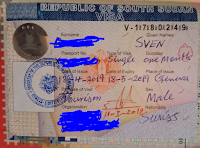 Even though not many airlines fly to South Sudan, physically getting here was not that difficult, but getting the tourist visa was a mess.
Even though not many airlines fly to South Sudan, physically getting here was not that difficult, but getting the tourist visa was a mess.
How to get a South Sudan tourist Visa?
 Even though not many airlines fly to South Sudan, physically getting here was not that difficult, but getting the tourist visa was a mess.
Even though not many airlines fly to South Sudan, physically getting here was not that difficult, but getting the tourist visa was a mess.It started with applying for a visa back home.
Because I wasn’t able to get an invitation letter (LOI) from South Sudan, as there are no tourist agencies in operation these days, I had many calls with the embassy regarding documents to submit and had to go for an interview with the ambassador.
Because I wasn’t able to get an invitation letter (LOI) from South Sudan, as there are no tourist agencies in operation these days, I had many calls with the embassy regarding documents to submit and had to go for an interview with the ambassador.
It was half a year ago when they told me to come to the embassy for an interview, but the specific person in charge didn't show up. They told me to arrange and come for another appointment a few months later. Yes, no problem, it’s a great pleasure to travel again 4 hours one way to come for another meeting.
A few months later I finally had another appointment for the interview, which was a very strange conversation.
A few months later I finally had another appointment for the interview, which was a very strange conversation.
After the interview, I got the approval to submit all the remaining documents they asked for, which they will check and decide upon. On a Sunday evening and only a few weeks before traveling, I got the info that they will give me the visa.
April 19 - Day 1 - Departure from Sudan and arrival in South Sudan
This early morning I flew from Khartoum (Sudan) to South Sudan’s capital Juba.Back in Sudan, there were still massive Sudan-Uprising protests going on, which also included the closure of Airports the previous days. It was totally unclear which planes are departing and which were not.
As South Sudan Airspace is still under the control of the Sudan government, yes – Sudan controls South Sudan airspace, also the South Sudan airport in Juba experienced closures over the last few days. I expected my flight will definitely get canceled.
So I couldn't really believe my luck today when they called for boarding. From then everything was fine and the BADR airplane departed on time. Sometimes things do go smoothly.
So I couldn't really believe my luck today when they called for boarding. From then everything was fine and the BADR airplane departed on time. Sometimes things do go smoothly.
Passport registration or not?
I arrived in Juba at 9am. After leaving the plane a team of fully covered medic staff was measuring the temperature of every passenger who exited the plane. It was because of the Ebola outbreak in DRC. From here on my same negative expectations rise again as I had a tourist visa but not an LOI to present at the immigration office.
However, the officer didn’t ask for anything else than the passport with the visa and so it ended up with two stamps. Two stamps, as one is the immigration stamp and the other saying that the visitor has to register with the ministry of the interior within 72 hours.
As I read about this registration and asked the South Sudan embassy back home for a letter of exemption so that I don’t need to register as my stay was less than 72 hours. I showed this this to the officer and got the answer:
Well, what an incredibly helpful answer. But as it was Good Friday and every ministry was closed. I anyway didn’t have another option than staying without registration.
During the first walk in the streets of Juba I was optimistic that I will have a pleasant stay, as my first attempts of taking photos were no problem, no one yelled or was upset when I used the camera.
Look, when you don’t want to register and have the letter, its up to you to do it or not. Ok?
Well, what an incredibly helpful answer. But as it was Good Friday and every ministry was closed. I anyway didn’t have another option than staying without registration.
Walking through the streets of Juba
Even after several confirmations beforehand, the driver from the hotel didn’t show up at the airport and so I had to take a taxi there. But no hassle here at all to have a fair-price taxi driver for the 10-minute ride.During the first walk in the streets of Juba I was optimistic that I will have a pleasant stay, as my first attempts of taking photos were no problem, no one yelled or was upset when I used the camera.
Although I sensed that it probably won't last the whole day.
It's still morning and people here are still sober and are busy doing their work, so most of them didn’t even notice. But with the incoming heat and tiredness, people get more upset the more time passed into the day and that’s what I experienced little by little.
Roundabout and All Saints Cathedral.
Roundabout and All Saints Cathedral.
At the Juba central market, I felt I had all eyes on me while walking and I didn’t even try to attempt to take a photo.
This was because after someone among many people became very upset and threatened to report me to the police. Thankfully the group of people whom I asked for permission to take photos all gathered and calmed down the other disturbed guy. The group was talking to the upset guy and told me to just leave to calm things down.
From here I realized it's actually a very bad idea to take photos here in South Sudan.
From here I realized it's actually a very bad idea to take photos here in South Sudan.
Taking pictures in South Sudan (better not)
It's funny that people here either fight to be in photos (and some almost "forced" me to take a photo of them) or shout at me from several dozen meters to "stop snapping".The ones who hate cameras can get very angry and with luck, there are some people on your side. In the worst case, they will report to the police.
It's probably very easy to get arrested here in South Sudan and they have a harsh “law” regarding media and news. But that’s not surprising, cause most media reports about South Sudan are all negative and seem to keep South Sudan in a negative light.
The president often pleads with the international media to not always report the negative stuff about them and also sometimes to show the good sides of South Sudan.
However, the line between good and bad is probably thin here.
The unhappiest country on earth?
The country was recently rated as the unhappiest country on earth. Although, I found people here to be friendly as everywhere else too when they were treated in a friendly way.People are very interested, come along to shake hands to say hello and start to tell about their country and tribes. Many of them didn't believe that I'm a tourist who comes only for visiting:
On the other side, they are very impulsive. Negativity and stress towards them or some unfriendliness can quickly turn them over to become heavily upset within seconds.
What, tourist? Haha,, yes of course. Soo, you work for the UN or an NGO?
On the other side, they are very impulsive. Negativity and stress towards them or some unfriendliness can quickly turn them over to become heavily upset within seconds.
Dirty city, poor people
Juba itself is a dirty city. There is just Juba as a city and then there are the villages, no second city. Only Juba. After the few years of the young country's history, they managed to build properly sealed roads on the few main roads. But off the main road, all the roads are dirt roads.Police stand basically everywhere, and if they are not visible, the chance is high there are police in civil clothes around.
Shipwreck along the White Nile
At the Nile river are some spots where it's no problem to walk around.There is the so-called "AFEX camp" which is a heavily secured compound where its necessary to deposit the passport at the security gate.
The area has many container apartments, mainly for NGO people but also for visitors it's possible to go to the restaurant within the compound, directly at the Nile.
This is the place where the big shipwreck is lying. This is also the area where it's possible to rent a Jet Ski and drive along the river.
Curious locals but most of them are friendly
Walking in Juba takes a long time and is hot. People look curiously when they see me walking around, I guess there are not so many white people walking around in Juba.I noticed all the time that white people are driving around with their white NGO/UN/RedCross SUV’s.
Further south is the bridge that crosses to the village that doesn't have an official name. On the way, there I noticed that taking photos became more annoying. When people saw me lifting my camera I heard whistles or yellings from locals, so I stopped with it.
Further south is the bridge that crosses to the village that doesn't have an official name. On the way, there I noticed that taking photos became more annoying. When people saw me lifting my camera I heard whistles or yellings from locals, so I stopped with it.
Locals and police sitting in the streets in the shadows
Along the road, all the people are sitting outside their houses and the under the trees.They can see everything, whereas I can't spot black people sitting in the shadows. Many of them have a lot of time and negative energy.
As I found out that photography is in general prohibited and also this explained a lot as well.
But the last thing I wanted was to become arrested and so have to be careful here. After a few times having discussions with locals about the photos, I didn't risk it.
South Sudan is a crazy place regarding photography, even in African circumstances.
South Sudan is a crazy place regarding photography, even in African circumstances.
Locals can get angry
The motorbike driver who brought me to the bridge warned me that this area is not safe and that I should be very careful, especially of the people living at the river next to the bridge.I don’t know why but indeed, after walking across the bridge I heard some people yelling, I guess they yelled at me, I didn’t turn around and continued walking. I asked another motorbike driver to bring me back to town, as I wasn’t really sure if someone who was yelling didn’t like that I was crossing the bridge without paying some “foreigner fee” to cross the bridge?
Governmental area - better to keep cameras in the pocket
On the other side of Juba is the area with more governmental buildings. The area is called "Ministries".It's obvious as a lot of trucks with soldiers are driving around. I don’t know why but I felt less secure in the area with soldiers and police, than walking in the area where the locals live.
At the monument place "Doctor John Garang's Memorial Park", I wanted to have a look at the statue and there were so many police standing around, so I thought I better go and asked if it is OK.
I guess they felt intrigued by my question. One guy in civil clothes, which turned out to be the boss soldier, wanted to know more and put me aside, checking my passport and couldn’t understand why I want to see the statue.
When I asked if I did something wrong he just laughed “No No No all good all good. So what will you do now?” I replied that I will go visit the place and the statue if he allows to.
So I guess I better shut up now and pretend that I've seen the statue now from 200 meters away.
Police and soldiers are very curious here, but they had to become like this to protect themselves. Their 7 years of experience in an ugly war left a lot of distrust.
You see it from here, so now you’ve seen it ok, or what else is your plan?
So I guess I better shut up now and pretend that I've seen the statue now from 200 meters away.
Police and soldiers are very curious here, but they had to become like this to protect themselves. Their 7 years of experience in an ugly war left a lot of distrust.
Day 2 - A visit to the Nile river
This morning the hotel reception told me that the small island “full moon island” is open again. It has a restaurant on it. The island is located a bit north of Juba along the river and it's possible to get there by boat for 5 USD.I didn’t have many more plans today, so I wanted to give it a try. The boat is said to be departing from the "Da Vinci Restaurant". It's beside the Juba bridge and a good restaurant.
Unfortunately, at the restaurant, I've been told the boat is broken these days and so no trip to the island is possible. But from here is a good view of the bridge and the river itself while having a coffee.
Unfortunately, at the restaurant, I've been told the boat is broken these days and so no trip to the island is possible. But from here is a good view of the bridge and the river itself while having a coffee.
There is even a security guard walking around the tables with his AK-47, checking all the time if the area along the river is clear of intruders.
There are three well-equipped supermarkets, mainly targeting NGO people and expats. People in South Sudan don’t have much money and the locals' biggest wealth are cows. The wealth of a family in South Sudan is measured by the number of cattle that each family owns.
On the way back from the supermarket I got stopped again by the police, asking me seriously:
Do you have permission to walk this street?
I heard a lot about corrupt police in South Sudan and experienced corruption in Africa all over. But this was ridiculous in its own way. I didn’t have to pay a bribe but it's showing again a little example that the war has left scars and soldiers have a lot of authority here to do whatever they want.
But I hope this country will manage to keep itself out of the war in the next few years, but probably they will not.
Rooftop restaurants with a good view
There are a few restaurants on several rooftop terraces and the view allows to have a glimpse into the area of Juba and the mountains around.The mountain in the background is the "Juba game reserve" but not many free-living animals are remaining there, as they all got killed during the war. The locals who live there used it all for food during the war.
Day 3 - Departure from the new Juba Airport
South Sudan is ranked as having one of the worst international airport in the world, but that's history now. The Juba airport has a new departure terminal it's a big improvement for the country. It even has A/C, free Wifi.Also, immigration works quickly upon leaving the country.
Most people on check-in were soldiers and NGO groups probably going home for Easter vacation. On Immigration I expected the police officer on immigration will ask for my “registration within 72 hours” but instead they were all very friendly and didn’t even look properly at the passport. When I replied I'm a tourist on a visit here he just laughed:
I was relieved when the call for boarding was announced as I heard president Kiir is leaving the country with his plane today and when that happens, all other flights will be delayed without further notice.
It was a short visit to the youngest country on earth and now the journey continues to Djibouti.
Most people on check-in were soldiers and NGO groups probably going home for Easter vacation. On Immigration I expected the police officer on immigration will ask for my “registration within 72 hours” but instead they were all very friendly and didn’t even look properly at the passport. When I replied I'm a tourist on a visit here he just laughed:
Sure, tourist..haha. Sir, thank you for your service and helping our country. You go back home for vacation? When you do you come back to South Sudan?
I was relieved when the call for boarding was announced as I heard president Kiir is leaving the country with his plane today and when that happens, all other flights will be delayed without further notice.
It was a short visit to the youngest country on earth and now the journey continues to Djibouti.



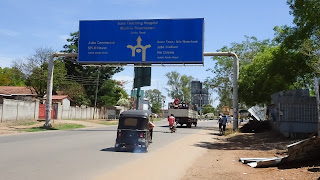


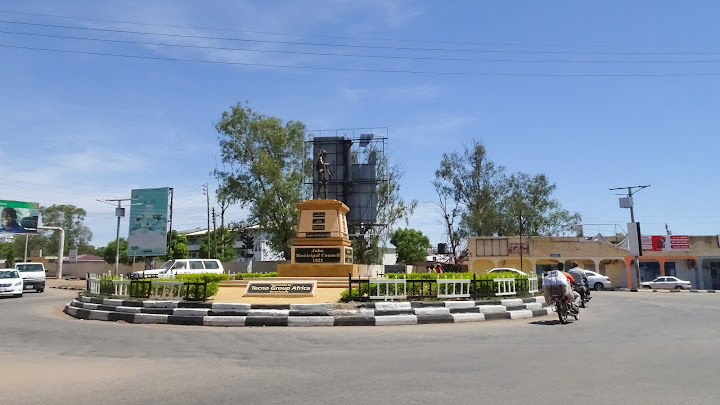






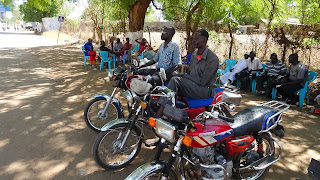
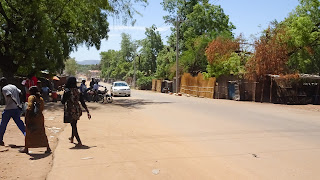


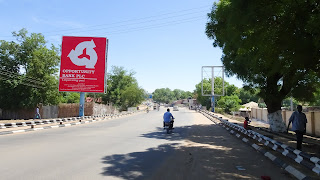



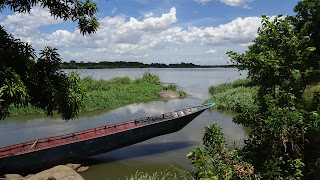








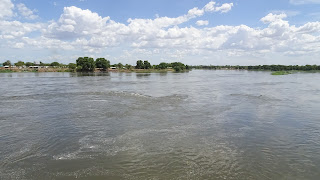
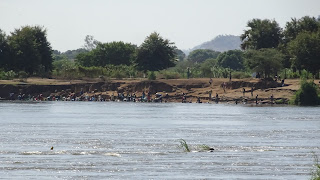




















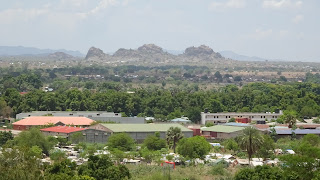


I first heard about Sudan myself in 2012 and had planned a trip to go there in 2013. Unfortunately, due to unexpected family complications, I had to postpone my trip. I have yet to go and with everything that has been happening since 2013, I had forgotten about this trip. I happened to be browsing your blog and spotted this article. Since I will have the time and the money, I am planning the trip now. It is not every day countries are declared and being that this is the “newest country” in the world, I want to see it for myself. Enjoyed all the pictures and information you had here as well. Furthered my desire to want to go as soon as I can.
ReplyDeleteThanks for reading. I suggest to wait a few more months or a year as I believe they will have REAL peace soon. There will be further peace agreements between Kiir and Machar. When they settled all, it surely gets a lot easier for tourism.
DeleteThanks Sven, Your insights were very helpfull
ReplyDeleteYeah, I'm not going to South Sudan so soon. I live in Brazil and honestly, I can see places like Juba's dirt clay streets in almost every single metropolis, city and town down here.
ReplyDeleteI get how a place like South Sudan can seem an exotic place to explore by a well-paid educated civilized Eastern European like you, Sven, but crime-ridden poverty-stricken places like Juba exist all over Brazil's territory, so I don't feel the need to travel to the other side of the Atlantic to visit a country where I can be mugged by some petty criminal, assaulted by some crazy-eyed drug addict, threatened by crooked cops or raped/murdered by some demented; I just need to buy a one-way bus ticket to the outskirts of the very metropolis I live in and idly wander around the streets of the suburbs.